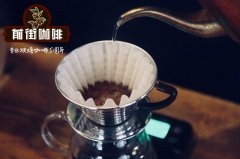Introduction of hand-made coffee made with honey from Frog Hill Manor in El Salvador

Professional coffee knowledge exchange More coffee bean information Please pay attention to coffee workshop (Weixin Official Accounts cafe_style)
Region: Santa Ana Volcano
Manor: Renus/Frog Hill Manor
Produced by Jose Antonio Salaverria
Harvest period: October every year to February every other year
Certification: Rainforest Alliance Certification
Treatment: honey treatment + natural drying
Breeds: Bourbon, Caturra, Catuai, Pacamara, Pakas
Altitude: 1450~1630 m
Flavor Description: Orange, almond, milk chocolate, rich in oil.
Renas (Frog Hill) Estate is located in the volcanic area of the Apaneca-Llamatepec Mountains in the west of Salvador. It originally came from the Hill of the Frogs (Frog Hill) behind the farm. The current owner Jose Antonio SalaverriaJose and his family work together to produce high quality coffee. The green coffee beans are picked from fully ripe cherries at harvest time, and part of the pulp and mucus are retained for fermentation. The pulp is regularly stirred and dried until completely dried, and then the shelling procedures are carried out. The production and environmental management of the whole estate are in line with the principles of RFA rainforest protection.
El Salvador coffee has five major producing areas (Apaneca, Central Belt, Chichontepec, Tecapa & Cacahuatique Mountain Range), roughly distributed in the volcanic ash covered mountain slopes or plateau areas above 1,200 meters above sea level, coffee trees are mostly planted in tall shade coffee (shade grown coffee) to avoid excessive temperatures and direct sun exposure, affecting the quality of coffee beans. November to February is the main coffee season, mainly Bourbon and Pacas, producing more than 150,000 tons of organic coffee per year.
The volcanic activity in El Salvador is very active, so it also brings mineral-rich volcanic ash geology to El Salvador. The soil composition of such sites is more mineral, but less organic matter. In order to maintain the proportion of soil composition and make up for the shortage of organic matter, the coffee farmers of El Salvador use the processed coffee pulp residue or organic matter under the coffee tree as fertilizer to supplement the lack of organic matter in the soil, so that the coffee fruit presents a richer and balanced flavor.
Important Notice :
前街咖啡 FrontStreet Coffee has moved to new addredd:
FrontStreet Coffee Address: 315,Donghua East Road,GuangZhou
Tel:020 38364473
- Prev

Introduction of Pacamara hand-made coffee in Guatemalan forest manor
Professional coffee knowledge exchange more coffee bean information please follow the coffee workshop (Wechat official account cafe_style) the coffee beans produced in Guatemala with seven major coffee producing areas are all Arabica, all located in the highland topography of the subtropical climate, rich and stable rainfall, fertile volcanic ash soil, so that all parts of the dangerous country have a natural environment that is very suitable for coffee cultivation.
- Next

Introduction of handmade coffee in Gopagabana, Lake Diditicaca, Bolivia
Professional coffee knowledge exchange for more information about coffee beans, please follow the coffee workshop (Wechat official account cafe_style) Bolivia. Lake Diditicaca. Gopagabana production area: Diditicaca Lake producer: Gopagabana (Copacabana) small farmers altitude: about 1500m 1650m varieties: Tibikadura treatment: washing harvest time: June to December flavor description:
Related
- Detailed explanation of Jadeite planting Land in Panamanian Jadeite Manor introduction to the grading system of Jadeite competitive bidding, Red bid, Green bid and Rose Summer
- Story of Coffee planting in Brenka region of Costa Rica Stonehenge Manor anaerobic heavy honey treatment of flavor mouth
- What's on the barrel of Blue Mountain Coffee beans?
- Can American coffee also pull flowers? How to use hot American style to pull out a good-looking pattern?
- Can you make a cold extract with coffee beans? What is the right proportion for cold-extracted coffee formula?
- Indonesian PWN Gold Mandrine Coffee Origin Features Flavor How to Chong? Mandolin coffee is American.
- A brief introduction to the flavor characteristics of Brazilian yellow bourbon coffee beans
- What is the effect of different water quality on the flavor of cold-extracted coffee? What kind of water is best for brewing coffee?
- Why do you think of Rose Summer whenever you mention Panamanian coffee?
- Introduction to the characteristics of authentic blue mountain coffee bean producing areas? What is the CIB Coffee Authority in Jamaica?

